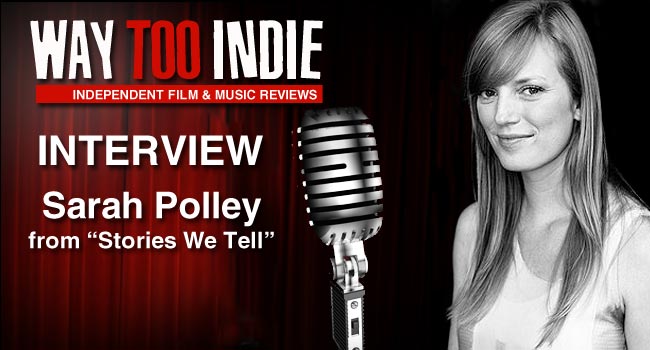Interview: Sarah Polley of Stories We Tell

Director Sarah Polley took time to sit with us at the San Francisco International Film Festival to talk about her critically acclaimed, hyper-personal documentary, Stories We Tell, in which she excavates her late mother, Diane’s life story by interviewing friends and family.
When the film first screened, I remember you being hesitant to do interviews, wanting the film to speak for itself. It must have been nerve-racking putting your family’s history out there for the world to see. How scared were you to share the film with people?
It was terrifying. I can’t say I’ve ever been that stressed out by sharing anything. I was exposing not only myself, but my family, and you don’t know what kind of criticisms are going to fall down on people and what you’ll expose them to.
It’s now been half a year since you’ve shared the film—how has the experience been?
It’s been great, actually. It’s been the richest experience I’ve ever had in terms of promoting a film, which usually…you kind of end up with your roster of answers and you’re basically being asked the same questions. With this film, I find I’m constantly surprised by people’s responses and the questions I’m getting. Everyone seems to have seen a different film. It’s a real privilege to get to open up a story like this, look at the idea of storytelling, and hear [people’s] various responses and the stories that come out of that.
One of the subjects in the film talks about different circles of stories centered on your mother, emanating out—second hand stories, third hand, fourth. Now that people have seen the film, there’s this gigantic fifth circle that have their own stories to tell. What have the responses been like?
That’s what’s been really interesting—there seem to be so many people who have stories like this in their own lives or know people who have stories. For me it’s strange because, in a way, the audience, the critics, the people who write or talk about the film become this strange extension of the film because the story is still changing and getting mutated and misinterpreted and getting analyzed differently by everyone. It’s sort of a continuation of the project of the film to look at the noise of all those voices.
Your father, Michael Polley, narrates the film, reading his memoirs. He has an amazing voice!
A big part of me wanting to make the film was wanting to record him reading his writing and the stories he was creating out of [the events in the film] having happened and the fact that this information having crashed on most people would have created a lot of negative feelings ended up giving him this sort of opening to look very candidly and eloquently at his own life.
You film your dad reading his memoirs in a sound studio, and you also have a camera on yourself behind the mixing board, directing him. Where did the idea come from to show this interaction?
I didn’t even think I was going to use that footage, but it became really important all of a sudden that I be in the film as a character of a filmmaker and we see the construction of the film. Because the film is about storytelling and the way stories come out of a particular set of events, to show the construction of this story from the filmmaker’s perspective seemed to be really important.
The film revolves around your mother, but by its conclusion, she remains an enigmatic figure.
I learned a ton about my mom, but the truth is, she’s not here to speak for herself—she will remain enigmatic to an extent. We’re never going to really know the way she would phrase her thoughts and feelings about these events, she does remain elusive. I definitely wanted to paint a clear picture of her based on everybody’s recollections, but I think I knew going in I was never going to ‘get her’ [or] get some accurate sense of who exactly she was.
Everybody in the film gets a fair say.
That was the idea, that everybody would have their chance to have their voice included, even if it wasn’t their full version. Everybody’s version would be respected.
The film touches on delicate subjects. Were there times where you thought that a certain element of the story would make the film flow better, but you didn’t want to include it because it was too personal?
There [were a lot] of situations like that, but it was helpful that I have relationships with everybody in the film because I had a very strong internal barometer for what would be ok and what wouldn’t be ok. I don’t think I lied about anybody and I tried not to manipulate, but certainly some things were kept in and other things were not kept in, based on wanting to make sure I was as humane as possible in the process, which I think is something we shouldn’t ignore as filmmakers.
Would you ever consider making another film like this one?
I’d love to make another documentary at some point. I obviously wouldn’t make another one about my family. I think it would be hard for me to make a documentary now because it would be hard to make a straight-ahead film, but I don’t think I could make a film as complicated as this either (laughs). But, I would love to make another documentary because I respect the medium so much.
